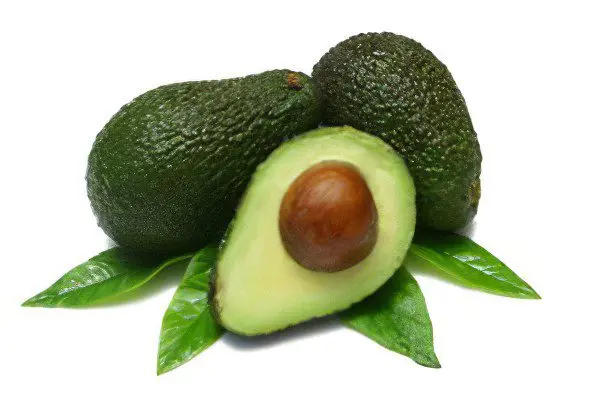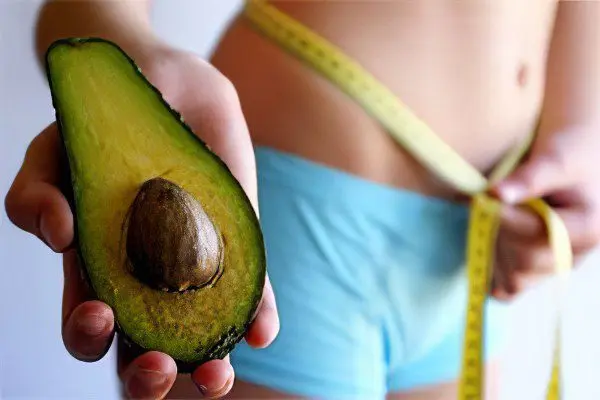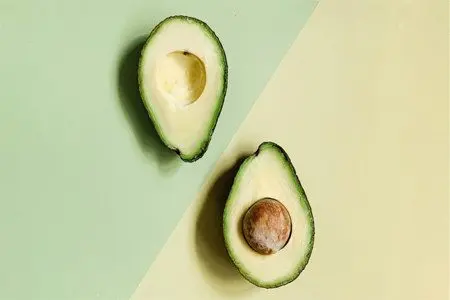Contents
- What is the flavor of an avocado?
- The benefits of avocado
- Composition and calorie content
- 14 Health Benefits of Avocados
- 1 Potassium source
- 2 Enriched with beneficial fatty acids
- 3 Fiber Source
- 4 Protects the heart and blood vessels
- 5 Influences the lipid profile
- 6 Supports overall health
- 7 Helps in the absorption of nutrients
- 8 Protects the eyes
- 9 Antitumor properties
- 10 Relieves symptoms of arthritis
- 11 Helps reduce weight
- 12 Keeps babies healthy
- 13 Protects against depression
- 14 Provides detoxification

Avocado is an evergreen plant that bears fruit, which belongs to the genus Perseus of the laurel family. If the plant itself is called American Perseus, then the fruit that this tree gives is called an avocado, and among the people – “butter pear”.
Perseus americana is a very tall tree, capable of reaching 20 meters. The trunk is most often straight, many branches depart from it. The leaves are elliptical in shape, their average length is 35 cm. During flowering, small green flowers appear on the tree, they are located in the axils of the leaves.
The fruit itself is a fruit in the form of a pear, an ellipse, or a ball. As the avocado ripens, it increases in size and can reach 20 cm in length. The weight of a ripe fruit varies from 50 g to 1,8 kg. Inside it is one large seed. If the fruit is unripe, then the skin covering it will have a dark green color. After the avocado is fully ripe, after some time, the peel becomes black. The flesh of the fruit is fatty, juicy, oily, yellow-green or green in color. It tastes slightly sweet, not sour.
The tree began to be cultivated since ancient times, archaeologists indicate that people grew it even before the advent of our era – in the third millennium. Now it grows in many tropical and subtropical regions of the world, including Latin and South America, Africa, the Middle East, etc. Up to 200 kg of fruit can be harvested from one tree. There are more than 400 varieties of avocados. Despite the fact that avocados do not grow in Europe, you can buy the fruit here all year round.
What is the flavor of an avocado?

The taste of avocados is original, delicate and dull, reminiscent of either a tart pear or a pumpkin. If the fruit is unripe, then it will taste the most like an unripe pear. When an avocado ripens, its flesh becomes tender, oily, like butter with the addition of greens puree to it. A nutty taste is possible, similar to that which remains in the mouth after eating pine nuts.
Thanks to such an unusual taste, avocados are widely used in cooking. It is added to salads, cold appetizers, sandwiches. So that the appearance of the fruit and its taste does not deteriorate due to oxidation in the air, avocados are sprinkled with lemon or lime juice.
The most famous dish with the addition of avocado is guacamole, a traditional Mexican snack.
Is avocado a fruit or a vegetable?
Many people often ask, is an avocado a fruit or a vegetable? We answer: avocado is a fruit, although it is unsweetened.
The benefits of avocado
Not so long ago, avocado was perceived as an exotic tropical fruit. Now it has become one of the usual products that are highly valued for its medicinal and nutritional qualities.
The rich pulp of avocados has a pleasant taste and gives dishes a special nutritional value. For example, in Mexico, the avocado has been used as a staple food for centuries. It is the base ingredient of the famous guacamole sauce. From South American cuisine, avocados have migrated to the culinary recipes of all peoples of the world, thanks to their “super” qualities.
Different varieties of avocados are used for food, which differ in appearance, shape and color of the skin. Depending on the type, the fruits can be round, pear-shaped, green, black. The weight of one avocado can range from 220 grams to 1,4 kilograms.
The most common avocado variety is Hass, which is called the alligator pear. This name was assigned to the variety because of the pear-shaped shape and bumpy skin, like alligator skin. The pulp of the fruit is yellow-green in color, has an oily texture and a mild taste. The value of avocado is that it contains a lot of vitamins, minerals, vegetable fatty acids, fiber. At the same time, unlike other fruits, avocados are practically devoid of carbohydrates.
Composition and calorie content
The calorie content of avocado is 161 kcal per 100 g.
Calories 161 KKal
- Fats:
14,8 g
- Proteins:
2 g
- Carbohydrates:
7,9 g
- Water:
74,3 g
- Ash:
1 g
- Cellulose:
5,9 g
Vitamins (in 100 g): | Quantity | %RDN |
Vitamin B5 (pantothenic acid) | 0,97-1,9 mg | 19,4% |
Vitamin K | 21 mcg | 17,5% |
Vitamin B9 (folic acid) | 62-89 μg | 14,8% |
Vitamin B6 (pyridoxine) | 280 mg | 14% |
Vitamin E (alpha tocopherol) | 1,97 mg | 13,1% |
Vitamin C (ascorbic acid) | 7,9-8,8 mg | 11,3% |
Vitamin B3 (PP, nicotinic acid) | 1,92 mg | 9,6% |
Minerals (in 100 g): | Quantity | %RDN |
Bor | 100 mcg | 142,9% |
Nickel | 4,8-486 μg | 140% |
potassium | 238-599 mg | 20% |
Copper | 135-262 μg | 19% |
Rubidium | 17,3 mcg | 17,3% |
Molybdenum | 10 mcg | 14,3% |
Manganese | 210-226 μg | 11% |
Magnesium | 39-42 mg | 10,1% |
Cobalt | 1 mcg | 10% |
Full chemical composition ➤
Other important connections:
Phytosterols — 85 mg (154,6% of RDI)
Purine — 13 mg (10% of RDI)
14 Health Benefits of Avocados

1 Potassium source
Most people are deficient in potassium, a mineral essential for nervous system health, cardiovascular function, fluid balance, and blood pressure control.
It is generally accepted that bananas are the main source of potassium, but this is not true. Avocados have a lot more potassium. 100 g of avocado pulp contains 14-20% of the required daily requirement of potassium.
A medical study has shown that adding avocados to your daily diet reduces the risk of hypertension. Along with this, the likelihood of developing a heart attack, stroke, kidney failure is reduced. [1].
2 Enriched with beneficial fatty acids
Avocado is a unique fruit that contains an incredible amount of fat. Of the total calorie content of fruit pulp, more than 75% are monounsaturated fats. Thanks to these indicators, avocados are the fattest vegetable product in the world.
Most of the monounsaturated fats in avocados are oleic acid. This substance is the basis of olive oil and has pronounced healing properties. Oleic acid suppresses the inflammatory process, prevents the occurrence of certain types of cancer. The anticarcinogenic properties of monounsaturated fatty acids are realized through the effect on the genetic material of the cell. [2].
Avocado fats are ideal for cooking by heat treatment. They have a high boiling point, therefore they are resistant to oxidation, and are not converted into harmful compounds.
3 Fiber Source
Avocados contain a lot of plant fibers. From the total volume of fiber, 25% of soluble and 75% of insoluble plant substances are isolated. Avocado fiber helps to reduce weight, prevent jumps in blood glucose. The combined properties of fiber normalize metabolism, prevent the appearance of various pathological foci. [3].
It should be noted that soluble fiber supports a healthy intestinal microflora and preserves the body’s immunity.
4 Protects the heart and blood vessels
According to the program of the Department of Internal Medicine and Nutrition of the University of Kentucky [4], high fiber intake is associated with a significantly lower risk of coronary heart disease, stroke, hypertension, diabetes, obesity, and certain gastrointestinal diseases.
Increased fiber intake has also been shown to lower blood pressure and cholesterol levels, improve insulin sensitivity, and promote weight loss in obese people.
5 Influences the lipid profile
Heart disease kills the largest number of people in the world. Medical observations of people have proven the positive effect of avocados on risk factors.
An analysis of the results of eight studies found that regular consumption of avocados: [5], [6], [7], [8], [9], [10], [11]
Reduces total cholesterol levels.
Reduces triglyceride levels by up to 20%.
Reduce the concentration of bad cholesterol (LDL) up to 22%.
Increase good cholesterol (HDL) by up to 11%.
When following a vegetarian diet, avocados stabilize cholesterol levels due to vegetable fats. [12].
6 Supports overall health
A large-scale NHANES survey in the United States covered more than 17,5 thousand people. It turned out that those of the participants who consumed avocados several times a week had fewer complaints about their well-being. They received nutrients that protect against metabolic syndrome, a condition that leads to heart disease and diabetes. [13].
Evaluation of the subjects showed that with regular use of avocados, the body mass index decreases, the volume of visceral fat decreases. It is important that at the same time there was an increase in HDL (good cholesterol).
7 Helps in the absorption of nutrients
Eating healthy food does not guarantee the full absorption of valuable vitamins, minerals, amino acids and other useful components. To get the maximum benefit, you need to fully absorb the incoming nutrients. For example, for the absorption of vitamins A, D, E, K, some antioxidants require fats, since they are fat-soluble compounds. Avocado fats are a kind of conductors that combine with nutrients and help them assimilate.
A medical experiment has shown that the inclusion of avocado pulp or oil in salads, sauces increases the absorption of antioxidants up to 15 times. [14].
These data suggest that avocados are an essential part of the vegetarian diet, as they improve the absorption of all plant-based foods.
8 Protects the eyes
Avocados do more than just promote the absorption of vital antioxidants. This product itself is a source of powerful antioxidants – lutein and zeaxanthin, which are necessary for maintaining eye health and maintaining visual acuity. [15]. Observations suggest that they reduce the risk of cataracts, prevent macular degeneration. These conditions are characteristic of the elderly, therefore, after 50 years, the introduction of avocados into the diet is highly desirable.
9 Antitumor properties
The study of the anti-cancer properties of avocados in the laboratory began relatively recently. The results of the first studies suggest that the active substances of this fruit mitigate the negative effects after chemotherapy, restore lymphocytes [16].
Another test-tube experiment showed that avocado extract inhibited the growth of altered prostate cancer cells. [17]. Folic acid contained in avocados suppresses cell mutations and protects against tumors of the colon, stomach, and cervix.
10 Relieves symptoms of arthritis
Arthritis is a common chronic disease, which is accompanied by changes in the bone and cartilage tissue, a pronounced inflammatory process and pain syndrome. Numerous medical experiments prove that avocado extract combined with soybean oil alleviates the clinical picture of osteoarthritis [18], [19].
11 Helps reduce weight
The nutritional qualities of avocados make you feel full quickly. One study found that eating avocados suppressed the desire to eat by 28% for 5 hours. [20].
In the long term, eating the oily avocado fruit allows you to consume fewer calories, improve absorption. A healthy diet allows you to reduce weight and normalize eating behavior.
12 Keeps babies healthy
Avocado amino acids are important for a healthy pregnancy. Folic acid ensures the proper formation of the neural tube, prevents spontaneous miscarriage.
13 Protects against depression
Valuable plant elements of avocados prevent the growth of homocysteine concentration, which disrupts the transport of nutrients to the brain. These processes provoke a disorder of cerebral circulation.
Inadequate nutrition of the centers of the brain, an increase in the level of homocysteine inhibit the synthesis of serotonin, dopamine and norepinephrine. These essential hormones regulate emotional mood, sleep, and appetite.
14 Provides detoxification
Avocado plant fibers normalize bowel function, ensure the health of intestinal microflora. The use of the product contributes to the regular physiological emptying and elimination of toxins. Avocado fiber supports the immune functions of the body, protects against inflammatory processes.
[Video] Dr. Berg – AVOCADO BENEFITS, 5 Health Benefits:









